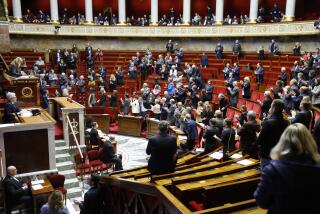D’SOUZA’S OPTIMISM
- Share via
Ironically, Charles Johnson’s passionate denunciation of Dinesh D’Souza’s book, “The End of Racism” (“Widening the Racial Divide,” Nov. 26) is evidently the reversal of the author’s liberal stance in the current national debate about the controversy regarding race and racism. For once, it is liberals who are advocates of politically correct thinking and orthodoxy in regard to racial matters while conservatives are the policy innovators and intellectual heretics on the subject. Here is one place in which normative ideological views about the status quo and progress don’t seem to have the perfect fit they should.
D’Souza’s book is a testament to just how mainstream the once-futile conservative intellectual argument has become. It is revealing that Johnson largely concedes the conservative thesis about an American “civilizational crisis.” Instead, he spends much of his review attacking the various solutions that D’Souza offers to address the existence of this crisis. But in doing so, he inadvertently reveals liberals’ failure to explain why, over the last 30 years, the outcome of various liberal policies is that we have witnessed a deterioration rather than an improvement in American race relations. The depth of liberal bewilderment, rage and hypocrisy are evident in Johnson’s refusal to subject his fellow liberals’ real policy damage to the rigorous standards that he insists upon applying to D’Souza’s largely hypothetical assumptions.
It then emerges that D’Souza may be better informed about America’s racial history than Johnson allows, because from the dual vantage point of an “outsider” (neither black nor white but Indian) and a conservative (an intellectual dissenter in an overwhelmingly liberal elite culture) he can appraise the subject without the complexes that white and black insider observers find themselves having to deal with (guilt feelings among whites and victim status among blacks), which prevent them from taking a badly needed fresh look at it.
A different and more sympathetic interpretation of “The End of Racism” would contend that while racism is far from finished, with the right solutions it will be possible to solve it. The optimism with which conservatives like D’Souza approach the subject is a far cry from the contemptuous fatalism with which Johnson and his fellow liberals regard anyone interested in promoting a nonliberal alternative to liberal policies that have failed.
NORMAN F. BIRNBERG, LONG BEACH
More to Read
Sign up for our Book Club newsletter
Get the latest news, events and more from the Los Angeles Times Book Club, and help us get L.A. reading and talking.
You may occasionally receive promotional content from the Los Angeles Times.










